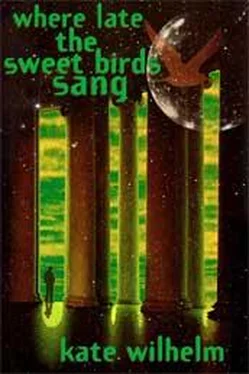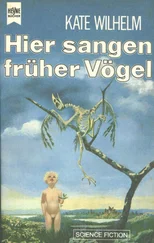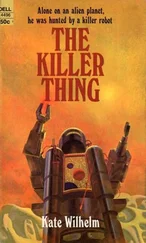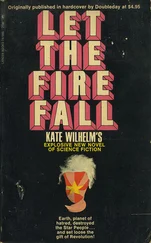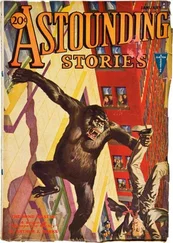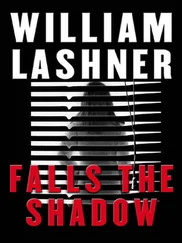“We have to get back, or they’ll send a search party for us,” she said. “I’ll try to change it,” she whispered then. “If I can.”
Two days later she left.
David spent New Year’s Eve at the Sumner farm with his parents and a horde of aunts and uncles and cousins. On New Year’s Day, Grandfather Sumner made an announcement. “We’re building a hospital up at Bear Creek, this side of the mill.”
David blinked. That was a mile from the farm, miles from anything else at all. “A hospital?” He looked at his uncle Walt, who nodded.
Clarence was studying his eggnog with a sour expression, and David’s father, the third brother, was watching the smoke curl from his pipe. They all knew, David realized. “Why up here?” he asked finally.
“It’s going to be a research hospital,” Walt said. “Genetic diseases, hereditary defects, that sort of thing. Two hundred beds.”
David shook his head in disbelief. “You have any idea how much something like that would cost? Who’s financing it?”
His grandfather laughed nastily. “Senator Burke has graciously arranged to get federal funds,” he said. His voice became more caustic. “And I cajoled a few members of the family to put a little in the kitty.” David glanced at Clarence, who looked pained. “I’m giving the land,” Grandfather Sumner went on. “So here and there we got support.”
“But why would Burke go for it? You’ve never voted for him in a single campaign in his life.”
“Told him we’d dig out a lot of stuff we’ve been sitting on, support his opposition. If he was a baboon, we’d support him, and there’s a lot of family these days, David. A heap of family.”
“Well, hats off,” David said, still not fully believing it. “You giving up your practice to go into research?” he asked Walt. His uncle nodded. David drained his cup of eggnog.
“David,” Walt said quietly, “we want to hire you.”
He looked up quickly. “Why? I’m not into medical research.”
“I know what your specialty is,” Walt said, still very quietly. “We want you for a consultant, and later on to head a department of research.”
“But I haven’t even finished my thesis yet,” David said, and he felt as if he had stumbled into a pot party.
“You’ll do another year of donkey work for Selnick and eventually you’ll write the thesis, a bit here, a dab there. You could write it in a month, couldn’t you, if you had time?” David nodded reluctantly. “I know,” Walt said, smiling faintly. “You think you’re being asked to give up a lifetime career for a pipe dream.” There was no trace of a smile when he added, “But, David, we believe that lifetime won’t be more than two to four years at the very most.”
David looked from his uncle to his father, to the other uncles and cousins in the room, and finally to his grandfather. He shook his head helplessly. “That’s crazy. What are you talking about?”
Grandfather Sumner let out his breath explosively. He was a large man with a massive chest and great bulging biceps. His hands were big enough to carry a basketball in each. But it was his head that was his most striking feature. It was the head of a giant, and although he had farmed for many years, and later overseen the others who did it for him, he had found time to read more extensively than anyone else that David knew. There was no book, except the contemporary best sellers, that anyone could mention that he wasn’t aware of, or hadn’t read. And he remembered what he read. His library was better than most public libraries.
Now he leaned forward and said, “You listen to me, David. You listen hard. I’m telling you what the goddamn government doesn’t dare admit yet. We’re on the first downslope of a slide that is going to plummet this economy, and that of every other nation on earth, to a depth that they never dreamed of.
“I know the signs, David. The pollution’s catching up to us faster than anyone knows. There’s more radiation in the atmosphere than there’s been since Hiroshima — French tests, China’s tests. Leaks. God knows where all of it’s coming from. We reached zero population growth a couple of years ago, but, David, we were trying, and other nations are getting there too, and they aren’t trying. There’s famine in one-fourth of the world right now. Not ten years from now, not six months from now. The famines are here and they’ve been here for three, four years already, and they’re getting worse. There’re more diseases than there’s ever been since the good Lord sent the plagues to visit the Egyptians. And they’re plagues that we don’t know anything about.
“There’s more drought and more flooding than there’s ever been. England’s changing into a desert, the bogs and moors are drying up. Entire species of fish are gone, just damn gone, and in only a year or two. The anchovies are gone. The codfish industry is gone. The cod they are catching are diseased, unfit to use. There’s no fishing off the west coast of the Americas.
“Every damn protein crop on earth has some sort of blight that gets worse and worse. Corn blight. Wheat rust. Soybean blight. We’re restricting our exports of food now, and next year we’ll stop them altogether. We’re having shortages no one ever dreamed of. Tin, copper, aluminum, paper. Chlorine, by God! And what do you think will happen in the world when we suddenly can’t even purify our drinking water?”
His face was darkening as he spoke, and he was getting angrier and angrier, directing his unanswerable questions to David, who stared at him with nothing at all to say.
“And they don’t know what to do about any of it,” his grandfather went on. “No more than the dinosaurs knew how to stop their own extinction. We’ve changed the photochemical reactions of our own atmosphere, and we can’t adapt to the new radiations fast enough to survive! There have been hints here and there that this is a major concern, but who listens? The damn fools will lay each and every catastrophe at the foot of a local condition and turn their backs on the fact that this is global, until it’s too late to do anything.”
“But if it’s what you think, what could they do?” David asked, looking to Dr. Walt for support and finding none.
“Turn off the factories, ground the airplanes, stop the mining, junk the cars. But they won’t, and even if they did, it would still be a catastrophe. It’s going to break wide open. Within the next couple of years, David, it’s going to break.” He drank his eggnog then and put the crystal cup down hard. David jumped at the noise.
“There’s going to be the biggest bust since man began scratching marks on rocks, that’s what! And we’re getting ready for it! I’m getting ready for it! We’ve got the land and we’ve got the men to farm it, and we’ll get our hospital and we’ll do research in ways to keep our animals and our people alive, and when the world goes into a tailspin we’ll be alive and when it starves we’ll be eating.”
Suddenly he stopped and studied David with his eyes narrowed. “I said you’d leave here convinced that we’ve all gone mad. But you’ll be back, David, my boy. You’ll be back before the dogwoods bloom, because you’ll see the signs.”
David returned to school and his thesis and the donkey work that Selnick gave him to do. Celia didn’t write, and he had no address for her. In response to his questions his mother admitted that no one had heard from her. In February in retaliation for the food embargo, Japan passed trade restrictions that made further United States trade with her impossible. Japan and China signed a mutual aid treaty. In March, Japan seized the Philippines, with their fields of rice, and China resumed its long-dormant trusteeship over the Indochina peninsula, with the rice paddies of Cambodia and Vietnam.
Читать дальше
